Ninja's training
- This programming problem is an example of dynamic programming, a commonly used problem-solving approach in software development
- The concept of maximizing merit points over a range of choices without repeating the same activity, is similar to the real-world challenges that software like Google Calendar or Apple Health face
- These apps need to suggest optimal fitness or productivity schedules based on a user's availability and preferences, ensuring a range of activities are covered without repetition on consecutive days
- Such problems are solved using dynamic programming algorithms, just like this ninja training schedule problem
A ninja has planned a n-day training schedule. Each day he has to perform one of three activities - running, stealth training, or fighting practice. The same activity cannot be done on two consecutive days and the ninja earns a specific number of merit points, based on the activity and the given day.
Given a n x 3-sized matrix, where matrix[i][0], matrix[i][1], and matrix[i][2], represent the merit points associated with running, stealth and fighting practice, on the (i+1)th day respectively. Return the maximum possible merit points that the ninja can earn.
Examples:
Input: matrix = [[10, 40, 70], [20, 50, 80], [30, 60, 90]]
Output: 210
Explanation:
Day 1: fighting practice = 70
Day 2: stealth training = 50
Day 3: fighting practice = 90
Total = 70 + 50 + 90 = 210
This gives the optimal points.
Input: matrix = [[70, 40, 10], [180, 20, 5], [200, 60, 30]]
Output: 290
Explanation:
Day 1: running = 70
Day 2: stealth training = 20
Day 3: running = 200
Total = 70 + 20 + 200 = 290
This gives the optimal points.
Input: matrix = [[20, 10, 10], [20, 10, 10], [20, 30, 10]]
Constraints
- 1 <= n <= 104
- n == number of rows in matrix
- 3 == number of columns in matrix
- 0 <= matrix[i][j] <= 1000
Hints
- "Let dp[i][j] be the maximum merit points possible on day i if the ninja performs activity j (j ∈ {0,1,2}). The ninja must pick an activity different from the previous day's to maximize points. The final answer is the maximum value from the last row of dp"
- "A recursive approach without memoization leads to exponential complexity (O(3^n)) since we explore all choices. Using dynamic programming (O(n)), we store computed results in dp[][] to avoid redundant calculations."
Company Tags
Editorial
Why greedy approach will not work:
As the question asks to maximizing points, the initial approach that comes to mind is the greedy approach. The greedy strategy involves selecting the task with the maximum points each day, ensuring that the same task isn't repeated from the previous day. However, following this approach consistently may result in missing out on tasks that offer higher total points over time.
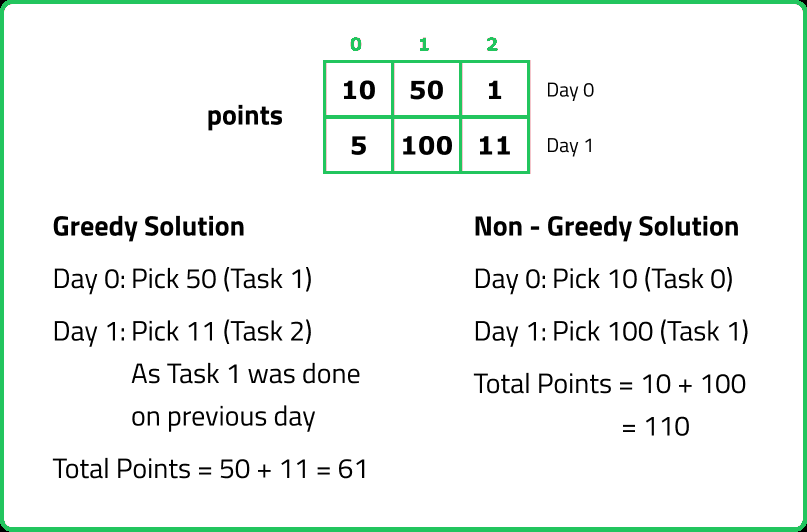
So, we observe that the greedy solution imposes restrictions on our choices, we can lose activity with better points on the next day in the greedy solution. Therefore, it is more advantageous to explore all possible choices as our next solution. We will employ recursion to generate all possible options.
Steps to form the recursive solution:
Every day we have the option of three activities(say 0,1,2) to be performed. Suppose that we are at a day_i. So we must know the task that was performed on the last day so that we do not repeat it on the present day. It is the ‘last’ choice that we tried out on day_i+1 ( i+1 in case of top-down recursion). Unless we know the last choice we made, we can not decide whether a choice we are making is correct or not.
Now there are three options each day(say 0,1,2) which becomes the ‘last’ of the next day. If we are just starting from the day(n-1), then for this day we can try all three options. We can say ‘last’ for this day is 3, which means any activity can be performed.
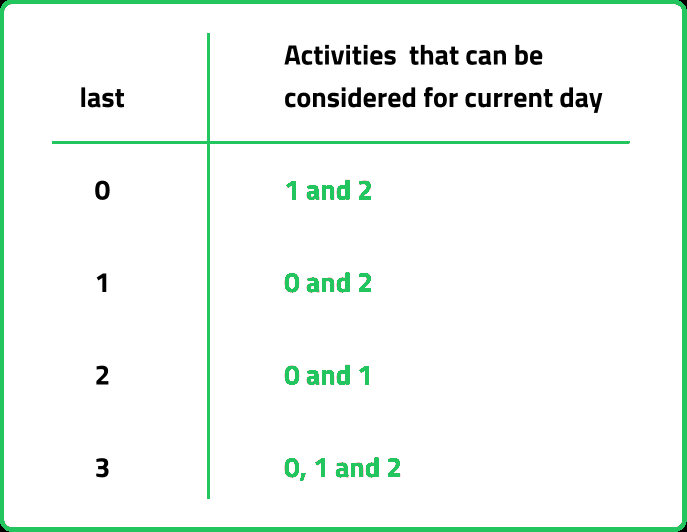
Therefore our function will take two parameters - day and last. f(day, last) will give the maximum points that can be made from day 'day' to day '0', keeping in check that the last activity is not being repeated on consecutive days.
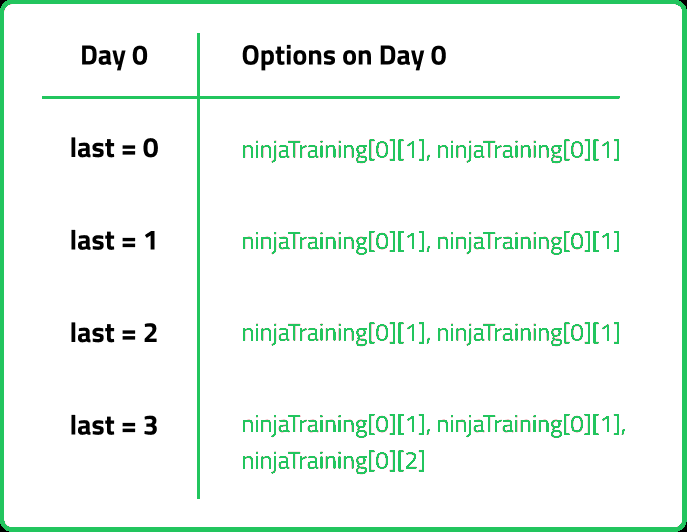
Other than the base case, whenever we perform an activity(i), its merit points will be given by points[day][i] and to get merit points of the remaining days we will let recursion do its job by passing f(d-1, i). We are passing the second parameter as i because the current day’s activity will become the next day’s last.
/*It is pseudocode and it is not tied to
any specific programming language.*/
f(day,last){
if(day == 0){
for(int i = 0; i <= 2; i++){
if(i != last) //code
}
}
for(int i = 0; i <= 2; i++){
if(i != last){
activity = points[day][i] + f(day-1, i)
}
}
}
/*It is pseudocode and it is not tied to
any specific programming language.*/
f(day,last){
if(day == 0){
maxi = 0
for(int i = 0; i <= 2; i++){
if(i != last) maxi = max(maxi,points[0][i]
}
return maxi
}
maxi = 0
for(int i = 0; i <= 2; i++){
if(i != last){
activity = points[day][i] + f(day-1, i)
maxi = max(maxi, activity)
}
}
return maxi
}
#include <bits/stdc++.h>
using namespace std;
class Solution {
private:
/* Recursive function to calculate the
maximum points for the ninja training*/
int func(int day, int last, vector<vector<int>> &points) {
// Base case
if (day == 0) {
int maxi = 0;
/* Calculate the maximum points for the first day
by choosing an activity different from last one*/
for (int i = 0; i <= 2; i++) {
if (i != last) maxi = max(maxi, points[0][i]);
}
// Return the maximum points
return maxi;
}
int maxi = 0;
// Iterate through activities for the current day
for (int i = 0; i <= 2; i++) {
if (i != last) {
/* Calculate the points for the current activity
and add it to the maximum points obtained so far */
int activity = points[day][i] + func(day - 1, i, points);
maxi = max(maxi, activity);
}
}
// Return the maximum points
return maxi;
}
public:
int ninjaTraining(vector<vector<int>>& matrix) {
int day = matrix.size()-1;
int last = 3;
return func(day, last, matrix);
}
};
int main() {
vector<vector<int>> points = {{10, 40, 70},
{20, 50, 80},
{30, 60, 90}};
//Create an instance of Solution class
Solution sol;
cout << sol.ninjaTraining(points);
}import java.util.*;
class Solution {
/* Recursive function to calculate the
maximum points for the ninja training*/
private int func(int day, int last, int[][] points) {
// Base case
if (day == 0) {
int maxi = 0;
/* Calculate the maximum points for the first day
by choosing an activity different from last one*/
for (int i = 0; i < 3; i++) {
if (i != last) {
maxi = Math.max(maxi, points[0][i]);
}
}
// Return the maximum points for the first day
return maxi;
}
// Initialize max points for the current day
int maxi = 0;
// Iterate through activities for the current day
for (int i = 0; i < 3; i++) {
if (i != last) {
/* Calculate the points for the current activity
and add it to the maximum points obtained so far */
int activity = points[day][i] + func(day - 1, i, points);
maxi = Math.max(maxi, activity);
}
}
// Return the maximum points for the current day
return maxi;
}
// Function to find the maximum points for ninja training
public int ninjaTraining(int[][] points) {
// Get the number of days
int days = points.length;
// Return the maximum points
return func(days - 1, 3, points);
}
public static void main(String[] args) {
int[][] points = {
{10, 40, 70},
{20, 50, 80},
{30, 60, 90}
};
// Create an instance of Solution class
Solution sol = new Solution();
// Print the maximum points for ninja training
System.out.println(sol.ninjaTraining(points));
}
}
class Solution:
""" Recursive function to calculate the
maximum points for the ninja training"""
def func(self, day, last, points):
# Base case
if day == 0:
maxi = 0
""" Calculate the maximum points for the first day
by choosing an activity different from last one"""
for i in range(3):
if i != last:
maxi = max(maxi, points[0][i])
# Return the maximum points for the first day
return maxi
# Initialize max points for the current day
maxi = 0
# Iterate through activities for the current day
for i in range(3):
if i != last:
"""Calculate the points for the current activity
and add it to the maximum points obtained so far"""
activity = points[day][i] + self.func(day - 1, i, points)
maxi = max(maxi, activity)
# Return the maximum points for the current day
return maxi
# Function to find the maximum points for ninja training
def ninjaTraining(self, points):
# Get the number of days
days = len(points)
# If there are no days, return 0
if days == 0:
return 0
# Return the maximum points
return self.func(days - 1, 3, points)
points = [
[10, 40, 70],
[20, 50, 80],
[30, 60, 90]
]
# Create an instance of Solution class
sol = Solution()
# Print the maximum points for ninja training
print(sol.ninjaTraining(points))
class Solution {
/* Recursive function to calculate the
maximum points for the ninja training*/
func(day, last, points) {
// Base case
if (day === 0) {
let maxi = 0;
/* Calculate the maximum points for the first day
by choosing an activity different from last one*/
for (let i = 0; i < 3; i++) {
if (i !== last) {
maxi = Math.max(maxi, points[0][i]);
}
}
// Return the maximum points for the first day
return maxi;
}
// Initialize max points for the current day
let maxi = 0;
// Iterate through activities for the current day
for (let i = 0; i < 3; i++) {
if (i !== last) {
/* Calculate the points for the current activity
and add it to the maximum points obtained so far*/
let activity = points[day][i] + this.func(day - 1, i, points);
maxi = Math.max(maxi, activity);
}
}
// Return the maximum points for the current day
return maxi;
}
// Function to find the maximum points for ninja training
ninjaTraining(points) {
// Get the number of days
let days = points.length;
// If there are no days, return 0
if (days === 0) return 0;
// Return the maximum points
return this.func(days - 1, 3, points);
}
}
let points = [
[10, 40, 70],
[20, 50, 80],
[30, 60, 90]
];
// Create an instance of Solution class
let sol = new Solution();
// Print the maximum points for ninja training
console.log(sol.ninjaTraining(points));
Complexity Analysis:
Time Complexity: O(3N), where N is the given size of 2D array. Exponential time complexity due to the recursive nature where each day can have up to 3 choices.Space Complexity:O(N), As the recursion depth is equal to the number of days (days). Therefore, the maximum depth of the recursion stack is O(N).
If we draw the recursion tree, we will see that there are overlapping subproblems. Hence DP approaches can be applied on the recursive solution.
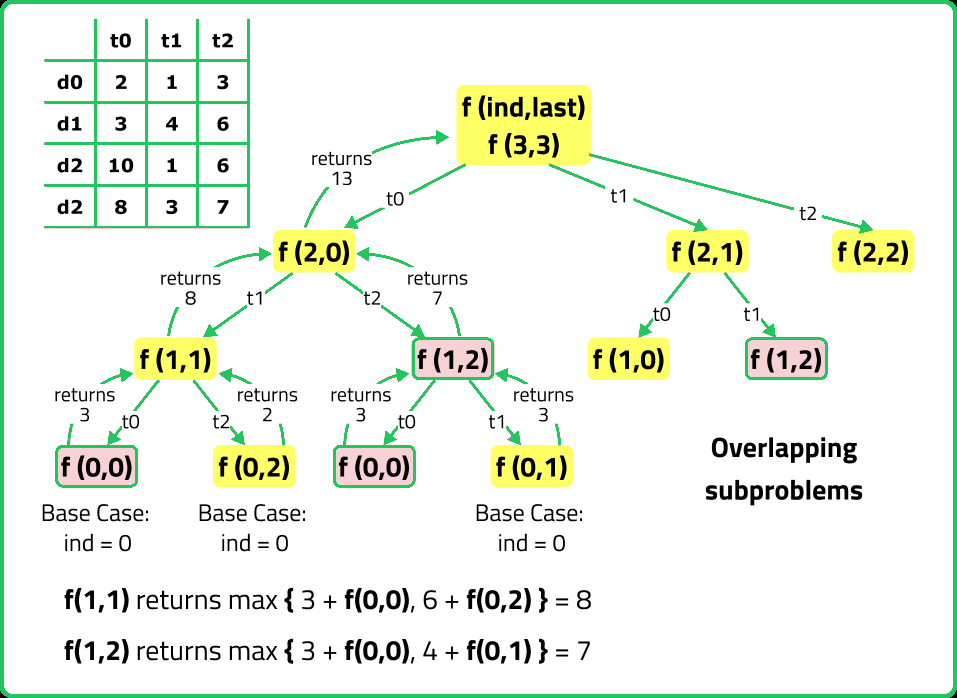
In order to convert a recursive solution to memoization the following steps will be taken:
It represents the solution to the subproblem for any given index. Initially, fill the array with -1, to indicate that no subproblem has been solved yet.
#include <bits/stdc++.h>
using namespace std;
class Solution {
private:
/* Recursive function to calculate the
maximum points for the ninja training*/
int func(int day, int last, vector<vector<int>> &points, vector<vector<int>> &dp) {
/* If the result for this day and last
activity is already calculated, return it*/
if (dp[day][last] != -1) return dp[day][last];
// Base case
if (day == 0) {
int maxi = 0;
/* Calculate the maximum points for the first day
by choosing an activity different from last one*/
for (int i = 0; i <= 2; i++) {
if (i != last) maxi = max(maxi, points[0][i]);
}
// Store the result in dp array and return it
return dp[day][last] = maxi;
}
int maxi = 0;
// Iterate through activities for the current day
for (int i = 0; i <= 2; i++) {
if (i != last) {
/* Calculate the points for the current activity
and add it to the maximum points obtained so far */
int activity = points[day][i] + func(day - 1, i, points, dp);
maxi = max(maxi, activity);
}
}
// Store the result in dp array and return it
return dp[day][last] = maxi;
}
public:
int ninjaTraining(vector<vector<int>>& matrix) {
int day = matrix.size();
/* Create a memoization table
to store intermediate results*/
vector<vector<int>> dp(day, vector<int>(4, -1));
int last = 3;
return func(day-1, last, matrix, dp);
}
};
int main() {
vector<vector<int>> points = {{10, 40, 70},
{20, 50, 80},
{30, 60, 90}};
//Create an instance of Solution class
Solution sol;
cout << sol.ninjaTraining(points);
}import java.util.*;
class Solution {
/* Recursive function to calculate the
maximum points for the ninja training*/
private int func(int day, int last, int[][] points, int[][] dp) {
// If the result is already calculated, return it
if (dp[day][last] != -1) return dp[day][last];
// Base case
if (day == 0) {
int maxi = 0;
/* Calculate the maximum points for the first day
by choosing an activity different from last one*/
for (int i = 0; i < 3; i++) {
if (i != last) {
maxi = Math.max(maxi, points[0][i]);
}
}
// Store the result in dp array and return it
return dp[day][last] = maxi;
}
// Initialize max points for the current day
int maxi = 0;
// Iterate through activities for the current day
for (int i = 0; i < 3; i++) {
if (i != last) {
/* Calculate the points for the current activity
and add it to the maximum points obtained so far */
int activity = points[day][i] + func(day - 1, i, points, dp);
maxi = Math.max(maxi, activity);
}
}
// Store the result in dp array and return it
return dp[day][last] = maxi;
}
// Function to find the maximum points for ninja training
public int ninjaTraining(int[][] points) {
// Get the number of days
int days = points.length;
// Initialize a memoization table with -1 values
int dp[][] = new int[days][4];
for (int[] row : dp)
Arrays.fill(row, -1);
// Return the maximum points
return func(days - 1, 3, points, dp);
}
public static void main(String[] args) {
int[][] points = {
{10, 40, 70},
{20, 50, 80},
{30, 60, 90}
};
// Create an instance of Solution class
Solution sol = new Solution();
// Print the maximum points for ninja training
System.out.println(sol.ninjaTraining(points));
}
}
class Solution:
""" Recursive function to calculate the
maximum points for the ninja training"""
def func(self, day, last, points, dp):
""" Check if the result for this day and
last activity is already computed."""
if dp[day][last] != -1:
return dp[day][last]
# Base case
if day == 0:
maxi = 0
""" Calculate the maximum points for the first day
by choosing an activity different from last one"""
for i in range(3):
if i != last:
maxi = max(maxi, points[0][i])
# Store maximum points in the DP table and return it.
dp[day][last] = maxi
return dp[day][last]
# Initialize max points for the current day
maxi = 0
# Iterate through activities for the current day
for i in range(3):
if i != last:
"""Calculate the points for the current activity
and add it to the maximum points obtained so far"""
activity = points[day][i] + self.func(day - 1, i, points, dp)
maxi = max(maxi, activity)
# Store maximum points in the DP table and return it.
dp[day][last] = maxi
return dp[day][last]
# Function to find the maximum points for ninja training
def ninjaTraining(self, points):
# Get the number of days
days = len(points)
# Initialize a DP table to store the computed results.
dp = [[-1 for j in range(4)] for i in range(days)]
# If there are no days, return 0
if days == 0:
return 0
# Return the maximum points
return self.func(days - 1, 3, points, dp)
points = [
[10, 40, 70],
[20, 50, 80],
[30, 60, 90]
]
# Create an instance of Solution class
sol = Solution()
# Print the maximum points for ninja training
print(sol.ninjaTraining(points)) # Output should be 210
class Solution {
/* Recursive function to calculate the
maximum points for the ninja training*/
func(day, last, points, dp) {
/* If the result for this day and last
activity is already calculated, return it */
if (dp[day][last] !== -1) return dp[day][last];
// Base case
if (day === 0) {
let maxi = 0;
/* Calculate the maximum points for the first day
by choosing an activity different from last one*/
for (let i = 0; i < 3; i++) {
if (i !== last) {
maxi = Math.max(maxi, points[0][i]);
}
}
//Store the result in dp array and return it
dp[day][last] = maxi;
return dp[day][last];
}
// Initialize max points for the current day
let maxi = 0;
// Iterate through activities for the current day
for (let i = 0; i < 3; i++) {
if (i !== last) {
/* Calculate the points for the current activity
and add it to the maximum points obtained so far*/
let activity = points[day][i] + this.func(day - 1, i, points, dp);
maxi = Math.max(maxi, activity);
}
}
//Store the result in dp array and return it
dp[day][last] = maxi;
return dp[day][last];
}
// Function to find the maximum points for ninja training
ninjaTraining(points) {
// Get the number of days
let days = points.length;
/* Create a memoization table
to store intermediate results*/
let dp = new Array(days);
for (let i = 0; i < days; i++) {
dp[i] = new Array(4).fill(-1);
}
// Return the maximum points
return this.func(days - 1, 3, points, dp);
}
}
let points = [
[10, 40, 70],
[20, 50, 80],
[30, 60, 90]
];
// Create an instance of Solution class
let sol = new Solution();
// Print the maximum points for ninja training
console.log(sol.ninjaTraining(points));
Complexity Analysis:
Time Complexity: O(N*4*3). There are N*4 states and for every state, we are running a for loop iterating three times.Space Complexity:O(N) + O(N*4), We are using a recursion stack space(O(N)) and a 2D array (again O(N*4)). Therefore total space complexity will be O(N) + O(N) ≈ O(N)
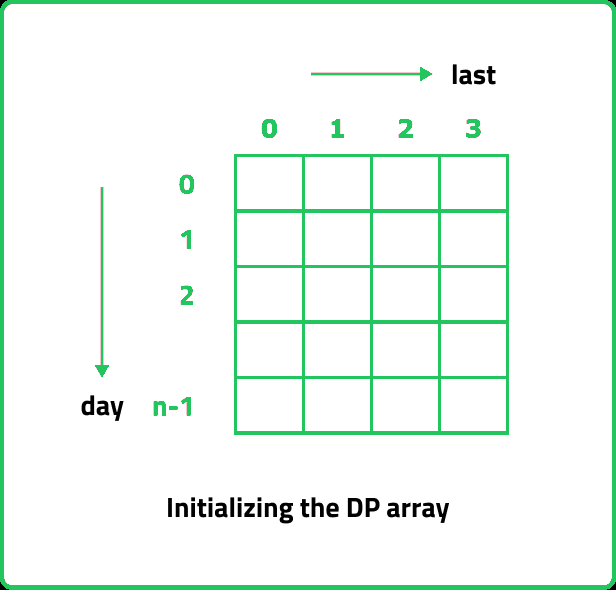
dp[0][0] = max(points[0][1], points[0][2]), when the last activity is 0.
dp[0][1] = max(points[0][0], points[0][2]), when the last activity is 1.
dp[0][2] = max(points[0][0], points[0][1]), when the last activity is 2.
dp[0][3] = max(points[0][0], points[0][1] and points[0][2]), when the last is 3, it means we are just starting from here and no activity has been performed yet.
#include <bits/stdc++.h>
using namespace std;
class Solution {
public:
/* Function to calculate the maximum
points for the ninja training*/
int ninjaTraining(vector<vector<int>>& matrix) {
int n = matrix.size();
// Create a 2D DP table to store the maximum points
vector<vector<int>> dp(n, vector<int>(4, 0));
// Initialize the DP table for the first day (day 0)
dp[0][0] = max(matrix[0][1], matrix[0][2]);
dp[0][1] = max(matrix[0][0], matrix[0][2]);
dp[0][2] = max(matrix[0][0], matrix[0][1]);
dp[0][3] = max(matrix[0][0], max(matrix[0][1], matrix[0][2]));
// Iterate through the days starting from day 1
for (int day = 1; day < n; day++) {
for (int last = 0; last < 4; last++) {
dp[day][last] = 0;
// Iterate through the tasks for the current day
for (int task = 0; task <= 2; task++) {
if (task != last) {
/* Calculate the points for the current
activity and add it to the maximum points
obtained on the previous day */
int activity = matrix[day][task] + dp[day - 1][task];
/* Update the maximum points for
the current day and last activity*/
dp[day][last] = max(dp[day][last], activity);
}
}
}
}
/* The maximum points for the last day with
any activity can be found in dp[n-1][3]*/
return dp[n - 1][3];
}
};
int main() {
vector<vector<int>> points = {{10, 40, 70},
{20, 50, 80},
{30, 60, 90}};
//Create an instance of Solution class
Solution sol;
cout << sol.ninjaTraining(points);
}import java.util.Arrays;
class Solution {
/* Function to calculate the maximum
points for the ninja training*/
public int ninjaTraining(int[][] matrix) {
int n = matrix.length;
// Create a 2D DP table to store the maximum points
int[][] dp = new int[n][4];
// Initialize the DP table for the first day (day 0)
dp[0][0] = Math.max(matrix[0][1], matrix[0][2]);
dp[0][1] = Math.max(matrix[0][0], matrix[0][2]);
dp[0][2] = Math.max(matrix[0][0], matrix[0][1]);
dp[0][3] = Math.max(matrix[0][0], Math.max(matrix[0][1], matrix[0][2]));
// Iterate through the days starting from day 1
for (int day = 1; day < n; day++) {
for (int last = 0; last < 4; last++) {
dp[day][last] = 0;
// Iterate through the tasks for the current day
for (int task = 0; task <= 2; task++) {
if (task != last) {
/* Calculate the points for the current
activity and add it to the maximum points
obtained on the previous day */
int activity = matrix[day][task] + dp[day - 1][task];
/* Update the maximum points for
the current day and last activity*/
dp[day][last] = Math.max(dp[day][last], activity);
}
}
}
}
/* The maximum points for the last day with
any activity can be found in dp[n-1][3]*/
return dp[n - 1][3];
}
public static void main(String[] args) {
int[][] points = {
{10, 40, 70},
{20, 50, 80},
{30, 60, 90}
};
// Create an instance of Solution class
Solution sol = new Solution();
// Print the maximum points for ninja training
System.out.println(sol.ninjaTraining(points));
}
}
class Solution:
""" Function to calculate the maximum
points for the ninja training"""
def ninjaTraining(self, matrix):
n = len(matrix)
# Create a 2D DP table to store the maximum points
dp = [[0] * 4 for _ in range(n)]
# Initialize the DP table for the first day (day 0)
dp[0][0] = max(matrix[0][1], matrix[0][2])
dp[0][1] = max(matrix[0][0], matrix[0][2])
dp[0][2] = max(matrix[0][0], matrix[0][1])
dp[0][3] = max(matrix[0][0], max(matrix[0][1], matrix[0][2]))
# Iterate through the days starting from day 1
for day in range(1, n):
for last in range(4):
dp[day][last] = 0
# Iterate through the tasks for the current day
for task in range(3):
if task != last:
""" Calculate the points for the current
activity and add it to the maximum points
obtained on the previous day"""
activity = matrix[day][task] + dp[day - 1][task]
"""Update the maximum points for
the current day and last activity"""
dp[day][last] = max(dp[day][last], activity)
""" The maximum points for the last day with
any activity can be found in dp[n-1][3]"""
return dp[n - 1][3]
points = [
[10, 40, 70],
[20, 50, 80],
[30, 60, 90]
]
# Create an instance of Solution class
sol = Solution()
# Print the maximum points for ninja training
print(sol.ninjaTraining(points))
class Solution {
/* Function to find the maximum
points for ninja training*/
ninjaTraining(matrix) {
let n = matrix.length;
// Create a 2D DP table to store the maximum points
let dp = new Array(n);
for (let i = 0; i < n; i++) {
dp[i] = new Array(4).fill(0);
}
// Initialize the DP table for the first day (day 0)
dp[0][0] = Math.max(matrix[0][1], matrix[0][2]);
dp[0][1] = Math.max(matrix[0][0], matrix[0][2]);
dp[0][2] = Math.max(matrix[0][0], matrix[0][1]);
dp[0][3] = Math.max(matrix[0][0], Math.max(matrix[0][1], matrix[0][2]));
// Iterate through the days starting from day 1
for (let day = 1; day < n; day++) {
for (let last = 0; last < 4; last++) {
dp[day][last] = 0;
// Iterate through the tasks for the current day
for (let task = 0; task < 3; task++) {
if (task !== last) {
/* Calculate the points for the current
activity and add it to the maximum points
obtained on the previous day */
let activity = matrix[day][task] + dp[day - 1][task];
/* Update the maximum points for
the current day and last activity*/
dp[day][last] = Math.max(dp[day][last], activity);
}
}
}
}
/* The maximum points for the last day with
any activity can be found in dp[n-1][3]*/
return dp[n - 1][3];
}
}
let points = [
[10, 40, 70],
[20, 50, 80],
[30, 60, 90]
];
// Create an instance of Solution class
let sol = new Solution();
// Print the maximum points for ninja training
console.log(sol.ninjaTraining(points));
Complexity Analysis:
Time Complexity: O(N*4*3). There are N*4 states and for every state, we are running a for loop iterating three times.Space Complexity:O(N*4), 2D array is being used to store the intermediate calculations.
If we closely look the relation obtained in the tabulation approach, dp[day][last] = max(dp[day][last],matrix[day][task] + dp[day-1][task])
Here the task can be anything from 0 to 3 and day-1 is the previous stage of recursion. So in order to compute any dp array value, we only require the last row to calculate it.
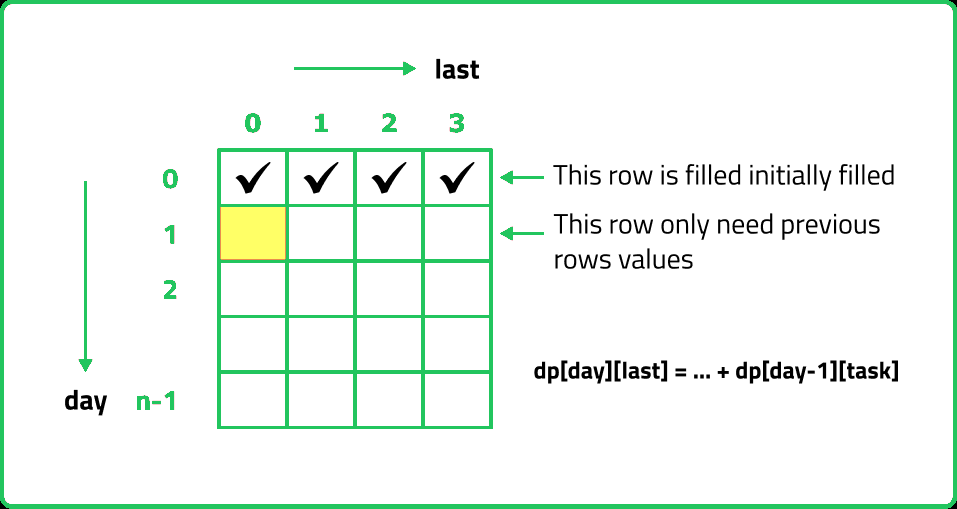
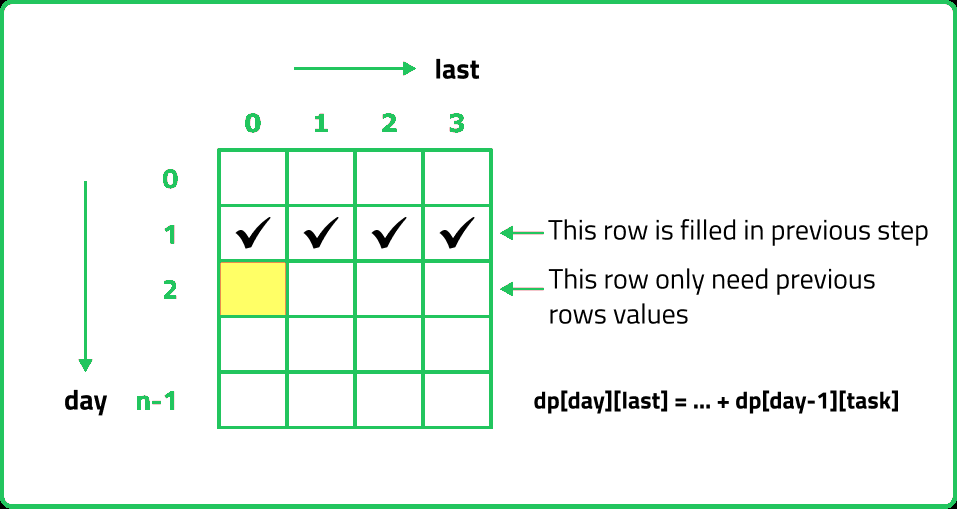
#include <bits/stdc++.h>
using namespace std;
class Solution {
public:
/* Function to calculate the maximum
points for the ninja training*/
int ninjaTraining(vector<vector<int>>& matrix) {
int n = matrix.size();
/* Initialize a vector to store the maximum
points for the previous day's activities*/
vector<int> prev(4, 0);
// Initialize the prev array for the first day (day 0)
prev[0] = max(matrix[0][1], matrix[0][2]);
prev[1] = max(matrix[0][0], matrix[0][2]);
prev[2] = max(matrix[0][0], matrix[0][1]);
prev[3] = max(matrix[0][0], max(matrix[0][1], matrix[0][2]));
// Iterate through the days starting from day 1
for (int day = 1; day < n; day++) {
/* Create a temporary vector to store the
maximum points for the current day's activities*/
vector<int> temp(4, 0);
for (int last = 0; last < 4; last++) {
temp[last] = 0;
// Iterate through the tasks for the current day
for (int task = 0; task <= 2; task++) {
if (task != last) {
/* Calculate the points for the current activity
and add it to the maximum points obtained on the
previous day (stored in prev)*/
temp[last] = max(temp[last], matrix[day][task] + prev[task]);
}
}
}
// Update prev with maximum points for the current day
prev = temp;
}
/* The maximum points for the last day with
any activity can be found in prev[3]*/
return prev[3];
}
};
int main() {
vector<vector<int>> points = {{10, 40, 70},
{20, 50, 80},
{30, 60, 90}};
//Create an instance of Solution class
Solution sol;
cout << sol.ninjaTraining(points);
}import java.util.Arrays;
class Solution {
/* Function to calculate the maximum
points for the ninja training*/
public int ninjaTraining(int[][] matrix) {
int n = matrix.length;
/* Initialize a vector to store the maximum
points for the previous day's activities*/
int[] prev = new int[4];
// Initialize the prev array for the first day (day 0)
prev[0] = Math.max(matrix[0][1], matrix[0][2]);
prev[1] = Math.max(matrix[0][0], matrix[0][2]);
prev[2] = Math.max(matrix[0][0], matrix[0][1]);
prev[3] = Math.max(matrix[0][0], Math.max(matrix[0][1], matrix[0][2]));
// Iterate through the days starting from day 1
for (int day = 1; day < n; day++) {
/* Initialize a temporary vector to store the
maximum points for the current day's activities*/
int[] temp = new int[4];
for (int last = 0; last < 4; last++) {
temp[last] = 0;
// Iterate through the tasks for the current day
for (int task = 0; task <= 2; task++) {
if (task != last) {
/* Calculate the points for the current activity
and add it to the maximum points obtained on the
previous day (stored in prev)*/
temp[last] = Math.max(temp[last], matrix[day][task] + prev[task]);
}
}
}
// Update prev with maximum points for the current day
prev = temp;
}
/* The maximum points for the last day with
any activity can be found in prev[3]*/
return prev[3];
}
public static void main(String[] args) {
int[][] points = {
{10, 40, 70},
{20, 50, 80},
{30, 60, 90}
};
// Create an instance of Solution class
Solution sol = new Solution();
// Print the maximum points for ninja training
System.out.println(sol.ninjaTraining(points));
}
}
class Solution:
""" Function to calculate the maximum
points for the ninja training"""
def ninjaTraining(self, matrix):
n = len(matrix)
""" Initialize an array to store the maximum
points for the previous day's activities"""
prev = [0] * 4
# Initialize the prev array for the first day (day 0)
prev[0] = max(matrix[0][1], matrix[0][2])
prev[1] = max(matrix[0][0], matrix[0][2])
prev[2] = max(matrix[0][0], matrix[0][1])
prev[3] = max(matrix[0][0], max(matrix[0][1], matrix[0][2]))
# Iterate through the days starting from day 1
for day in range(1, n):
""" Initialize a temporary array to store the
maximum points for the current day's activities"""
temp = [0] * 4
for last in range(4):
temp[last] = 0
# Iterate through the tasks for the current day
for task in range(3):
if task != last:
""" Calculate the points for the current activity
and add it to the maximum points obtained on
the previous day"""
temp[last] = max(temp[last], matrix[day][task] + prev[task])
# Update prev with maximum points for the current day
prev = temp
""" The maximum points for the last day with
any activity can be found in prev[3]"""
return prev[3]
points = [
[10, 40, 70],
[20, 50, 80],
[30, 60, 90]
]
# Create an instance of Solution class
sol = Solution()
# Print the maximum points for ninja training
print(sol.ninjaTraining(points))
class Solution {
/* Function to calculate the maximum
points for the ninja training*/
ninjaTraining(matrix) {
let n = matrix.length;
/* Initialize an array to store the maximum
points for the previous day's activities*/
let prev = [0, 0, 0, 0];
// Initialize the prev array for the first day (day 0)
prev[0] = Math.max(matrix[0][1], matrix[0][2]);
prev[1] = Math.max(matrix[0][0], matrix[0][2]);
prev[2] = Math.max(matrix[0][0], matrix[0][1]);
prev[3] = Math.max(matrix[0][0], Math.max(matrix[0][1], matrix[0][2]));
// Iterate through the days starting from day 1
for (let day = 1; day < n; day++) {
/* Initialize a temporary array to store the
maximum points for the current day's activities*/
let temp = [0, 0, 0, 0];
for (let last = 0; last < 4; last++) {
temp[last] = 0;
// Iterate through the tasks for the current day
for (let task = 0; task <= 2; task++) {
if (task !== last) {
/* Calculate the points for the current activity
and add it to the maximum points obtained on
the previous day*/
temp[last] = Math.max(temp[last], matrix[day][task] + prev[task]);
}
}
}
// Update prev with maximum points for the current day
prev = temp;
}
/* The maximum points for the last day with
any activity can be found in prev[3]*/
return prev[3];
}
}
let points = [
[10, 40, 70],
[20, 50, 80],
[30, 60, 90]
];
// Create an instance of Solution class
let sol = new Solution();
// Print the maximum points for ninja training
console.log(sol.ninjaTraining(points)); // Output: 210
Complexity Analysis:
Time Complexity: O(N*4*3). There are N*4 states and for every state, we are running a for loop iterating three times.Space Complexity:O(4), We are using an external array of size ‘4’ to store only one row.
Frequently Occurring Doubts
Q: What is the most optimized approach?
A: Instead of a full dp[][] table (O(n * 3) space), maintain three variables tracking the last day's results (O(1)).
Q: What if there are more than three activities?
A: Extend the recurrence relation to exclude the previously chosen activity: dp[i][j]=max(dp[i−1][k]+matrix[i][j])∀k=j This increases time complexity to O(n * m) for m activities.
Interview Followup Questions
Q: How would this change if each activity had a cooldown period of k days before being reused?
A: Modify the recurrence to ensure that an activity cannot be picked if it was chosen in the last k days.
Q: Can this problem be solved using a segment tree for updates in a large dataset?
A: Yes, a segment tree allows efficient queries and updates to maximize dynamic merit point allocations.
Notes
Code
210
290
60